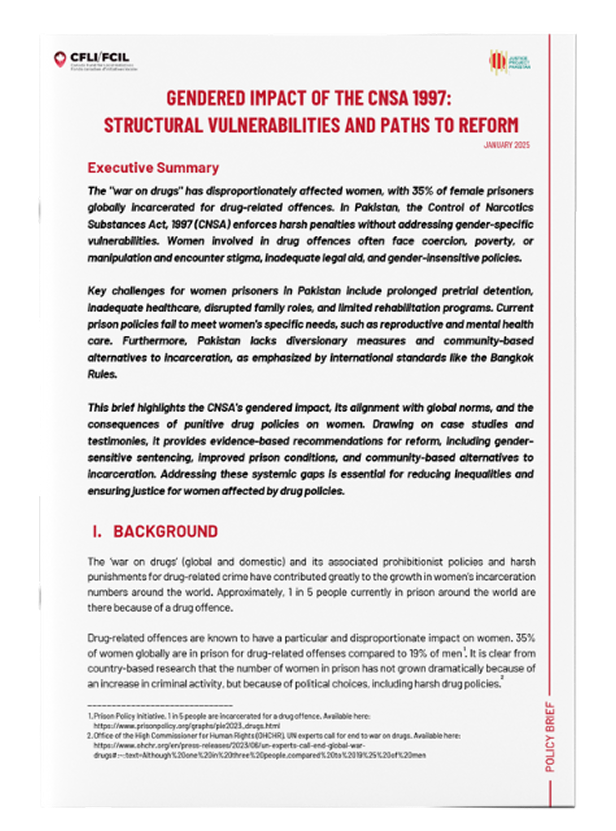Incarcerated women face distinct challenges, including inadequate healthcare, trauma, and lack of support. JPP is dedicated to advocating for policies that address these issues and promote the rights and dignity of women in the justice system.

JPP recognizes that women in prison often face distinct challenges, including inadequate healthcare, limited access to legal aid, and the psychological toll of separation from their children. We work to highlight these gaps and advocate for gender-responsive policies that ensure women are treated with fairness and humanity. Through research, legal support, and stakeholder engagement, we push for reforms that not only improve conditions for incarcerated women but also promote their reintegration into society with dignity and support.


Torture by police and other law enforcement agencies is so endemic and systematic in Pakistan that it is largely a common practice. Torture is accepted as an inevitable part of law enforcement in Pakistan, and perpetrators of torture are granted impunity through a combination of socio-cultural acceptance, lack of independent oversight and investigation mechanisms, widespread powers of arrest and detention, procedural loopholes and ineffective safeguards, including Pakistan’s failure to criminalise torture.
Justice Project Pakistan (JPP) undertakes robust advocacy to challenge the normalization of torture in Pakistan’s criminal justice system. Through strategic litigation, public campaigns, and policy engagement, JPP works to expose the systemic use of torture by law enforcement agencies and push for legal reform, including the criminalization of torture under Pakistani law. By documenting cases, amplifying the voices of survivors, and engaging with international human rights bodies, JPP aims to hold perpetrators accountable and dismantle the structures that enable impunity. At the heart of its advocacy is a commitment to upholding human dignity and ensuring that justice in Pakistan is free from violence and coercion.
JPP advocates for gender-responsive policies that acknowledge and address the unique forms of violence women face within the criminal justice system. Our research in districts like Faisalabad has revealed the specific ways in which women experience abuse—often at the hands of police who exploit their vulnerability. These include sexual violence, public humiliation, and psychological abuse through the torture of their family members. By bringing these patterns to light, JPP pushes for accountability, structural reform, and the development of policies that protect the rights and dignity of women in custody. Our work seeks to ensure that the justice system no longer ignores or perpetuates gender-based harm.

sing field research and case documentation, JPP exposes patterns of gender-based harm in policing and incarceration to influence legal and policy change.

sing field research and case documentation, JPP exposes patterns of gender-based harm in policing and incarceration to influence legal and policy change.

We work to amplify the experiences of incarcerated women and survivors of custodial abuse, ensuring their stories shape the national conversation on justice and accountability.


In partnership with the Cornell Center on the Death Penalty Worldwide, Justice Project Pakistan (JPP) contributed to Judged for More Than Her Crime — the first global report to examine how gender-based discrimination shapes the experiences of women facing the death penalty.Our initiatives are grounded in the belief that motherhood does not end at the prison gates. We work to ensure that incarcerated women—many of whom are primary caregivers—can maintain meaningful connections with their children during and after incarceration. By facilitating regular communication, visitations, and emotional support, we help preserve the bonds that are critical to a child’s well-being and a mother’s sense of purpose.
Drawing on years of litigation and fieldwork in Pakistan, JPP provided detailed case studies, legal analysis, and ground-level insights into how women—particularly those who are poor, uneducated, mentally ill, or survivors of abuse—are systematically failed by the justice system. Our research highlighted the way courts often ignore histories of trauma, impose harsh judgments based on gender norms, and deny women the right to fair representation.
This collaboration reflects JPP’s commitment to bringing the invisible into focus: to tell the untold stories of women on death row and advocate for reforms that recognize the full humanity and complexity of women in conflict with the law.

Our initiatives are grounded in the belief that motherhood does not end at the prison gates. We work to ensure that incarcerated women—many of whom are primary caregivers—can maintain meaningful connections with their children during and after incarceration. By facilitating regular communication, visitations, and emotional support, we help preserve the bonds that are critical to a child’s well-being and a mother’s sense of purpose.
In addition to strengthening family ties, we provide parenting resources, counseling, and legal aid to empower these women with the tools they need to navigate both the challenges of incarceration and the transition back into their families and communities. Our work is rooted in the understanding that when mothers are supported, entire communities benefit. By investing in their healing and dignity, we foster more stable, compassionate, and resilient futures for the next generation.
Support gender-responsive policies that protect the rights of women in the criminal justice system.